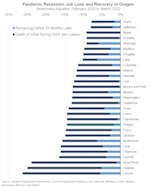Oregon has regained nearly nine out of every 10 jobs that were lost two years ago when the COVID-19 pandemic devastated the state and global economy.
But those jobs are not coming back evenly around the state.
Leading the rebound are cities other than Portland, in various parts of Oregon, with Bend ahead of the pack. Bend regained the equivalent of the jobs it had lost during the pandemic by this past January. The largest city in Central Oregon bounced back in part because one of the state’s hardest-hit employment sectors — hospitality and leisure — started to rebound earlier there than in other parts of the state.

A file photo of a Help Wanted sign. Oregon has regained nearly nine out of every 10 jobs that were lost two years ago when the COVID-19 pandemic devastated the state and global economy.
Matt Rourke / AP
“Those early shutdowns [in spring 2020] led to a 50% drop in total employment for these restaurants and hotels — roughly 5,300 jobs lost in Deschutes County,” said Damon Runberg, regional economist at the Oregon Employment Department for a five-county area in Central and Southern Oregon, in a January blog post. “We didn’t stay at the bottom long. In fact, by July 2020 the industry was only down around 17% from 2019 levels.”
According to data the employment department released this week, the Bend metropolitan area has continued to add jobs since winter, with payrolls now exceeding pre-pandemic levels by 1,760 jobs. Nearby Crook County also surpassed its pre-COVID employment levels, by 540 jobs.
Several areas are on the verge of adding back nearly all of the thousands of jobs lost during the pandemic. In the Columbia River Gorge, Hood River and Umatilla counties have restored 96% of the more than 5,000 jobs lost in those two counties.
Communities along the I-5 corridor of Salem, Albany and Grants Pass are also within a few percentage points of having their job numbers restored — with Salem short 500 jobs out of a total of more than 22,000 jobs lost; Albany down 190 jobs out of 5,800 jobs lost; and Grants Pass missing 180 jobs out of 3,420 lost. The reasons certain areas have recovered their jobs tend to relate to the main employment sectors and economic conditions in those places — with Salem, for instance, adding government jobs to provide services during down economic times.
One place where jobs have been slower to return than the state as a whole is Multnomah County — home to the most people and most jobs in Oregon. The county has recovered only a little more than half of its lost jobs — 59% — according to numbers kept by the Oregon Employment Department. That slow recovery is dragging down the job numbers for the entire Portland metro area, including Southwest Washington, where 83% of jobs have recovered — slightly lower than the Oregon average of 87%.
State employment economist Gail Krumenauer says the list of reasons that the Portland area is taking longer to recover its lost jobs is “a bit longer and more varied” than for other parts of the state.
“With more corporate headquarters and more professional and technical services type jobs, it’s possible that Portland lags a bit more on the retail and restaurant type services because those office workers who would utilize those services on weekdays are still mostly (or at least more) in home office situations,” Krumenauer said in an email to OPB.
Krumenauer wrote in some depth about the state’s uneven jobs recovery in an April 7 article.
“Also, while air travel has seen strong rebounds, businesses and conferences type travel isn’t back to where it was before the pandemic,” Krumenauer continued in her email. “Even though Portland doesn’t have a significantly higher share of leisure and hospitality jobs than the state, it is more likely to have that type of business-focused leisure and hospitality travel.”
Regional employment economist Amy Vander Vliet noted that in addition, manufacturing and private education sectors remain down in Multnomah County. And she noted that while warehouse expansions occurred in other parts of Oregon, they were less of a job creator in Portland.
The story is a little different in neighboring Clackamas and Washington counties, where 95% and 84% of jobs have returned, respectively.

The smaller the area you examine in Oregon, the greater the variation in job recovery since the pandemic.
Courtesy Oregon Employment Department
The smaller the area you examine in Oregon, the greater the variation. Some of the state’s least populous counties — Lake and Wheeler counties for instance — are at opposite ends of the job recovery chart. Wheeler has jumped 20% past its pre-pandemic employment levels, while Lake County has recovered only 38% of its losses. But the two counties combined have only 120 total jobs.
Portland’s not alone among the state’s urban areas trailing the state average in recovering jobs. College towns of Eugene and Corvallis have recovered roughly three out of every four jobs lost during the pandemic.
“[T]here is a high concentration of jobs in health care and education in Lane County and those industries are struggling to recover jobs,” said regional economist for Lane County, Brian Rooney, in an email to OPB. “Within professional and business services, it looks like some of the call centers and staffing agencies are down compared to pre-pandemic numbers.”
In nearby Benton County, regional economist Patrick O’Connor noted that the COVID-19 recession was different from other economic downturns. Often, periods of high unemployment will benefit higher education institutions, as people will enroll in college after they’ve lost work, “with enrollment and employment typically increasing during a recession.”
“That was not the case with this pandemic recession,” O’Connor said.
